#and gale talks about her like shes the beautiful embodiment of all magic
Explore tagged Tumblr posts
Text
OK, time for Hector to reap what he sowed by completely misunderstanding and agreeing to Gale's pickup line about showing him something 'magical.' 😂
Although actually, starting the conversation off, it doesn't entirely seem like he *did* misunderstand? So honestly, respect, Hector - it's not your fault, Gale is not being at all clear. XD We need to work on everyone's communication skills.

Hector finds him at the end of the evening in the midst of conjuring a small illusion - the image of a woman's face hovering in the palm of his hand.
"Who is that?" he asks softly.
Gale jumps, the illusion vanishing in an instant as he spins around.

"Oh! My, you startled me. I...I was miles away."

Hector gives a slight nod towards the wizard's now-empty hand. "I thought you wanted to show me something. Was that it?"
Gale stiffens slightly and looks away. "No, no," he says hastily. "She's no one, really. I was just...practicing an incantation."
Hector raises one eyebrow skeptically. [INSIGHT] "You don't have that look on your face when you're looking at 'no one.'" He's started to relax a little. Perhaps Lae'zel and Shadowheart didn't know what they were talking about - perhaps it really was just magic Gale wished to discuss.
Gale shakes his head, and his eyes take on a faraway look again. "What can I say? She's...she's Mystra."
Memories from his studies at the monastery drift through him, the knowledge of the pantheon as instinctual as breathing. Mystra - the mother of all magic, goddess of the Weave itself.
"I can't quite describe it, the need I sometimes feel to see her - to draw the filaments of fantasy into existence," Gale goes on. "No sculpture or painting could ever do her justice - only the fabric that she herself is and embodies - the Weave." He looks towards Hector again, a new light in his eyes as he speaks on this subject, something Hector has never seen there before. "Mystra is all magic. And as far as I'm concerned, she is all creation."
Hector has seen this light before, in the gaze of some of the more devout of the monks back at the monastery. It is not fanaticism, not quite - but a level of faith that borders on the passionate. "I didn't realize the depth of your devotion," he murmurs.
Gale nods vaguely, his thoughts still elsewhere. "Magic is...my life. I've been in touch with the Weave for as long as I can remember. There's nothing like it. It's like music, poetry, physical beauty all rolled into one and given expression through the senses." His eyes refocus abruptly on Hector. "That is why I asked you to seek me out, to offer you a taste of such wonders. Would you like me to show you?"
Hector breathes out slowly. Certainly, then, this is a demonstration of magic, and not whatever carnal adventures Lae'zel thought he was planning to delve into. And he is more than a little intellectually intrigued - he is no expert in magic beyond a few spells, and the curiosity that always defined him before this mess is being given space to rise to the surface again.
And yet, would that have been so bad? If he is to experience all the horrors of this world before he can find his way back to the safety of the monastery, why should he not experience some of its pleasures...
He shakes the thought away, nods slowly at Gale's offer. "Yes, I would," he says.
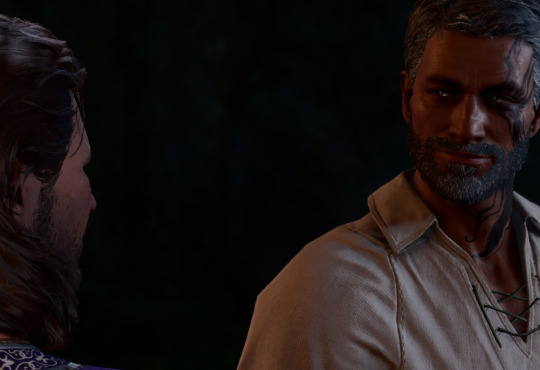
Gale smiles, and Hector finds himself returning the expression. "Then follow my lead."
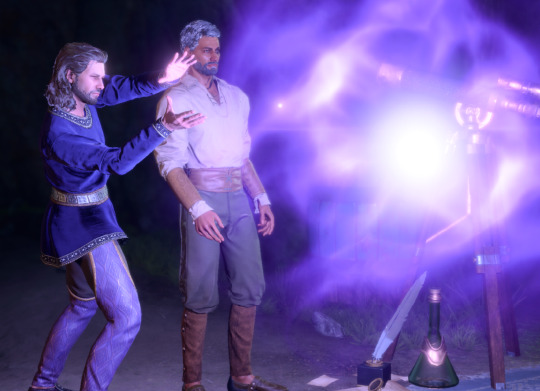
Gale settles himself at Hector's side, extends his arms and performs a slow, complicated series of gestures which sends a burst of multicolored light swirling into the air before them.
Hector watches, then blinks in surprise when Gale turns to him and prompts, "Now you."

He looks down at his own hands, and then his brows knit with an expression of intense concentration as he mimics Gale's pose.
[ARCANA] Imitate the gesture slowly and as precisely as you can.
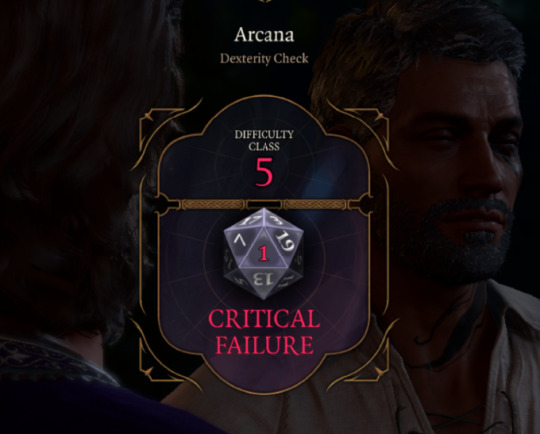
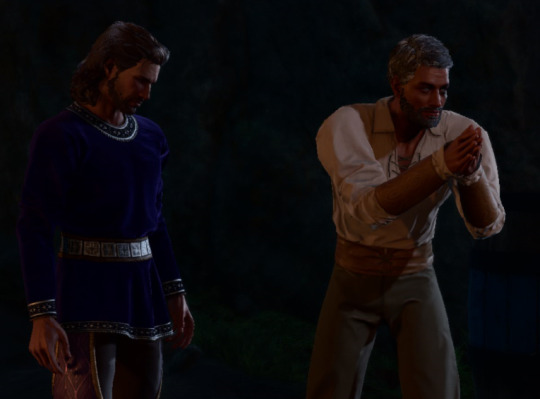
Still flustered by his earlier conversations, Hector's movements are awkward, a little distracted. Despite his concentration, his attempt at the spell does not go off.
Gale smiles, not unkindly. "Not quite. But this is the easy part. Shall we try again?"
Hector draws back, squares his shoulders, and closes his eyes for a moment. With the ease of practice, he centers himself meditatively, calming the agitation, the anxiety, rooting himself into the ground and the moment.
[ARCANA] Imitate the gesture again. Find the magic in the movement.

This time, he feels the power of the Weave catch itself up in the movements. The light bursts forward, and in equal reaction he feels a wave of warmth and calm slide through him.

Narrator: You feel something strange - like a kind word and a kind touch at the same time. It's warm and comfortable.
Hector's eyes drift half-shut. Gale speaks again, softer this time. "Now repeat after me. Ah-Thran Mystra-Ryl Kantrach-Ao." The words roll through the air, echoing back upon themselves. They shiver along his skin.
[ARCANA] You sense power in these words. Speak them deliberately.
The warmth deepens as the words resonate in his throat.
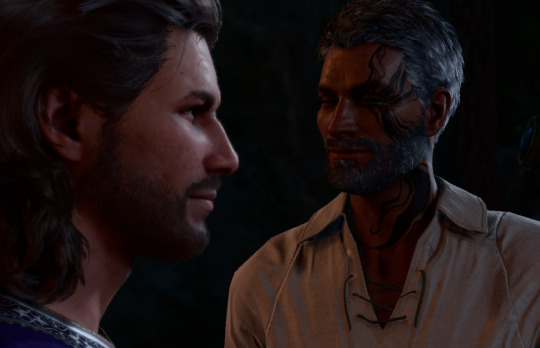
Narrator: Suddenly - the scent of rosewater and a sense of wellbeing. A sliver of Weave that tastes sweet on the tongue.
After the horrors of the day, this moment of peace and safety is almost overwhelming. He feels tears sprout in his eyes and swallows tightly to hold them back.
Gale is watching him intently. "Very good," he says gently. "Now I want you to picture in your mind the concept of harmony. As true as you can."
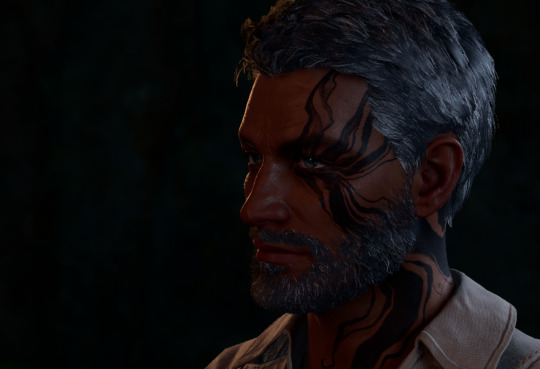
Hector's eyes flicker open as he considers the request. Harmony has felt so far away ever since the nautiloid found him. But here...it is quiet here.
[HISTORY] Think of the here and now - this unexpected moment of learning.
The warmth grows, the purple-blue light beginning to swirl around them, the camp and its people seeming suddenly very far away.

Narrator: You see - or is it sense? - the presence of a woman, the woman who hovered over Gale's palm. There's something like the anticipation of a kiss, then the pleasure of being cloaked in peace. You are safe. You are nestled in the cup of Mystra's hand.
Hector's breath catches. He is dimly aware that Gale is standing very close to him, their eyes locked, but for a moment he feels lost in that sensation of utter security.

Then the moment breaks, and Gale looks away, turning to take in the swirling light around them.
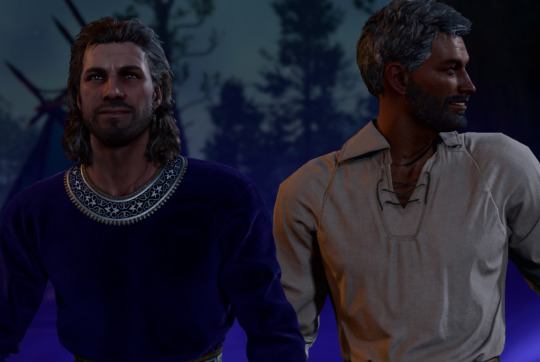
"You did it. You're channeling the Weave. How does it feel?"
It takes a moment for Hector to find his voice, to remember what words are.
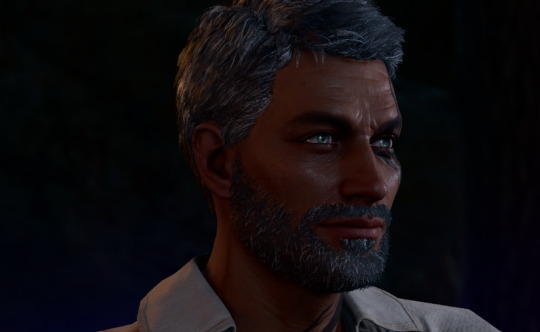
"Effortless," he murmurs. "You're a wonderful teacher."
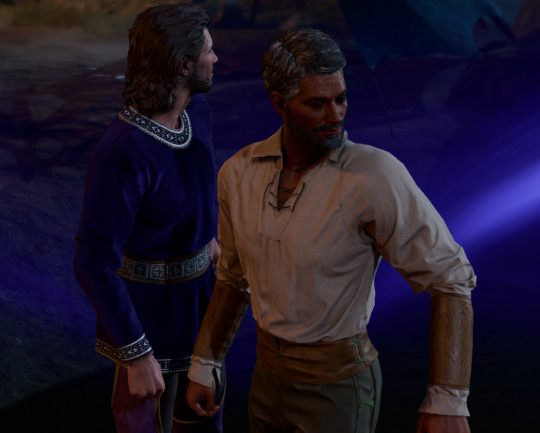
Narrator: The Weave connects you. The moment feels...intimate.
Hector swallows in a suddenly dry throat. Is this what Gale wanted? Was Lae'zel right after all? Is this a prelude to something physical, or even romantic?
It feels so safe, so warm. He doesn't want to leave that safety. He has been so afraid for days.
But his control, in spite of him, reasserts itself.
A satisfying end to a wondrous experience. It's time to let go.
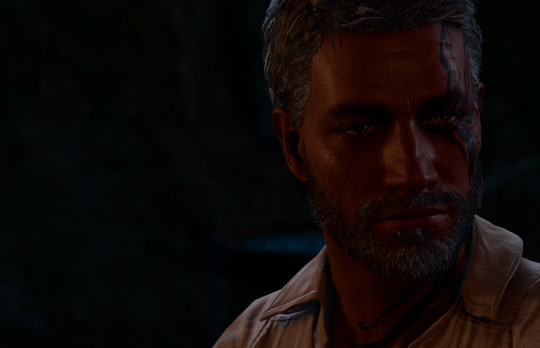
Narrator: The Weave evaporates, and as it does so, you realize the night feels suddenly cold and lonesome.
The feelings slip away, the warmth and safety replaced by a chill that goes into his bones. He makes a soft noise of regret, closes his eyes.
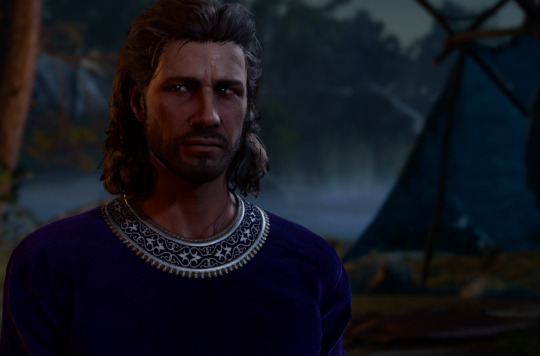
Gale has withdrawn back into himself as the sensation fades. "There it goes," he murmurs sadly. "How easily things slip away from us, no matter how hard they were in the obtaining." He hesitates, meets Hector's eyes for a moment, and then smiles. Something unsaid hangs in the air between them.

"Good night," he says softly. "I enjoyed sharing a moment of magic with you." And without waiting for a response, he turns and retreats into his tent, leaving Hector standing alone in the moonlit night.
#bjk plays baldur's gate 3#hector carlisle#well i'll be damned :P#hector was right after all#i rather like the way this ended up playing out#and i'm gonna go ahead and say gale is at least somewhat on the table for romance after this having happened#even if not though...this was a gift he desperately needed to find some equilibrium#so thank you for that gale
12 notes
·
View notes
Text
Gale Summarised Analysis
Disclaimer Game Version: All these analyses were written up to the game version v4.1.104.3536 (Early access). As long as new content is added, and as long as I have free time for that, I will try to keep updating this information. Written in May 2021.
The majority of sources used for this article are in the game itself (this includes my Gale-solo playthroughs as well as a combination of the videos by munmomuu and selphie1999), and the few dev’s notes provided by pjenn. Gale as origin is not taken into account since it’s not finished and has little to none Gale-related content. There will be little datamining content as well since pjenn said the game contained almost no gale-related notes (only in the Weave and in the Revelation scene).
Additional disclaimers about meta-knowledge and interpretations in (post)
The number between brackets [] represents the topic-block related to (this post), which gathers as much evidence as I could get.
We can infer about Gale by analysing what he approves and disapproves of. Sometimes, we can even lightly infer some information from his neutral reactions, but let’s be honest: this way of analysing a char is pretty poor since it leaves everything to speculation. Neutral reactions can only be analysed, in very rare instances, by contrasting the same situation in other contexts, and seeing what other options Gale approves or disapproves of. With these considerations in mind, we can proceed to describe this character.
Disclaimer: this is a meta with my personal interpretation of the character, sticking as much as possible to the facts and leaving little to “desires” or “projections” of what I want him to be. If I do so, I will state it explicitly in the text for the sake of analysis honesty. I want to be clear about what is canon (facts shown in bg3 EA), from what’s personal interpretation with little proof.
Understanding Gale (integrated text)
We are none of us monsters. We are merely hatcheries for monstrous things. So we fight them
---Gale
Collecting most of the information provided in-game, we know he has a cat, a Library, and writes poetry sometimes. One of the first things that Gale will reveal is that he is a private person. He easily and clearly sets boundaries from the first moment, showing Tav where they stand. The second aspect he makes us aware of is his pragmatic thinking and his preference for diplomatic approaches. A third aspect that stands out on its own: he is a very verbose person, maybe as a result of his academia background in combination with his poetry hobby. He also has a bad posture when talking, but I’m not sure if this is intentional or a bug.
We can assure that Gale certainly is a man of the city [13], and may have a decent social status. It's impossible to say for sure if it's noble or rich or both, or it is just a natural consequence of being a wizard scholar: he is frustrated by the harshness of the camping life, he misses the civilisation of the city which offers well cooked meals, soft beds, and scented baths. Not by chance he is the only companion in the group who would approve of giving Oskar 200 gold to fight “the discomforts of the road” [13]. However, he adapts. Despite the lack of luxuries, he managed to survive in the wilderness.
Gale and his link with magic is unquestionable. Magic is life for Gale, metaphorically and literally speaking since it's magic what allows him to stay alive despite the "orb" in his chest. If we talk about Magic, we have to talk about Mystra and the Weave. The Weave is not only the embodiment of Mystra, it's an extension of Mystra herself. It extends across many planes of existence and is in almost all parts of Faerûn. By dragging power from it, Magic can be performed.
Mystra, for lore reasons and conjectures that I will discuss in the post "Mystra and her Chosen ones", turned teenager/young adult Gale into one of her Chosen, making their relationship more intimate and granting Gale a deeper access to the Weave. This put Gale into the category of an archwizard. It's clear that Gale was and still is a devotee of Mystra, which could give us a hint of his alignment since she is a neutral good goddess and she expects for her Chosen to align around it.
Gale likes confidence, in others and in himself. He is confident in his looks (he has described himself as a “handsome devil” and answered during the romance/Revelation scene that he knew he was beautiful under the light as well as Tav). But beyond these two lines, qualifying him as a narcissist seems extreme. He is surely very confident about his knowledge, and we see he is not just mere words: his Mind Flayer knowledge is at the the same level of what githyankis know. If we compare how Astarion/Tav struggled with the book of Thay, and then we see how Gale manages it (sadly the scene is not complete yet in EA, and there is almost no datamining info of Gale), we can conclude once more that his knowledge and power of the mind are real (he is, so far, the main companion who allows us to explore the lore of the game in a deeper way during his conversations). We also know it's a bit more complicated to intrude into his mind using the tadpole because he has knowledge and mental tools to protect himself (check the post about the Tadpole inside Gale). He is certainly a very verbose and confident scholar, who knows his limits, and in occasions he seems to dabble into an ego-teasing play as an attempt of levity, displaying his “insufferable side”, as he has described himself (his self-awareness of these traits is remarkable, and it is the reason why I avoid qualifying him as arrogant. Arrogant chars are hardly self-aware of their own bad manners or insufferable traits). But we can see it's usually done as a joke or, with an evil Tav, as an aggressive reaction. For a deep analysis of this aspect, check the post about "Gale Hypotheses- Part 2", section: "Narcissism".
Based on his approvals and disapprovals, we can see that Gale has a strong preference in avoiding fights, violence, and bloodshed [1]. He will always prefer diplomatic and persuasive approaches [2]. Reasoning is his best weapon, but if the individual we are dealing with can hardly be persuaded, he would approve of a deception or an intimidation as long blood is not spilt. Here is where we see his pragmatism in action, all the time. His primary goal at every moment is to avoid bloodshed. His philosophy could be summed up in the line “the means [as long as they don’t kill gratuitously] hardly matter if the end is worthy”. And for Gale, nothing is more worthy than life [3]. This doesn't cover only the life of innocents he cares about, it includes the life of the most dubious characters as well, such as Rugan or Crusher. Gratuitous death is meaningless for him. During the scene of Nettie we can have a glimpse of his philosophy towards life: he viscerally hates treating life as if it were nothing:
Gale: How dare she snuff out life with as much thought as snuffing out a bloody candle? […] It's not right to feel the cold breath of death in your neck, then move on as if it was nothing but a soothing breeze. One respects life by fighting for it, and one respects death by fearing it.
Gale: One should never be afraid to live life to the fullest.
Probably the limited amount of life he has due to the "orb" increased his sense of respect for life and its celebration. I personally understand Gale as a character who embodies the perspectives of a seriously ill person, knowing that their life may be short, but they will try to make the best out of it.
He doesn't only respect life per se, he also cares about its dignity. This can be seen in his explicit rejection to undead existences such as Connor (he explains that it would be merciful to put an end to his undead nightmare), or in his disapprovals of humiliation and torture [9]
We could suspect that this emphasis in protecting any life comes from the fact that only people who are alive can (sometimes) be forgiven or/and change. This is not explicit, but since he is a character who talks about being better and wiser than his previous self, about acknowledging mistakes, about forgiveness, this interpretation seems reasonable.
These concepts of kindness and compassion combined with “the mistakes of the youth” are repetitive in his interactions and approvals [5,12]. Of course, they echo in his soul since they are reflections and desires of his own experience. This pattern covers forgiving children in particular [5], and disapproving hard judgements [16], especially on matters whose story is not fully understood by Tav. This means he doesn't like quick judgements when he doesn't know the whole story first. This scenario can be easily seen during Karlach's quest, he reserves his judgment until knowing Karlach's side: There are always two sides to each story.
Gale: I have to say I don't know if agreeing to this hunt was such a wise idea. Who's to say who's the real villain in this tale of devils and masquerades? [...]When we track Karlach down, let's chat before we chop.
Similar concept appears during his Revelation scene, when he encourages and keeps asking Tav to listen to him first before judging. This is also the reason why in his Loss scene he would disapprove if Tav quickly assumes that his loss of Mystra was due to arrogance. Tav judged him without knowing the whole story. However, once Tav knows the whole story, Gale will accept any judgement from them without approval penalties during the Revelation scene.
He approves all actions that imply helping others in hard times and disapproves of them if they were done out of greed [4]. He is an animal lover [6,7]. Being kind to animals and treating them good will increase his approval, while animal cruelty will earn his disapproval. Same goes for humanoids: any display of gratuitous violence that could have been prevented with a trick or a diplomatic approach, any humiliation forced upon others, any torture or situation of slavery, is disapproved [8, 9, 11].
In particular, Gale seems to advocate the philosophy of “give others their own medicine”[18] or in other words: poetic justice. We can see this during the Myconid colony; he approves of helping the Myconid to avenge the young killed by the Duergar, adding the comment: “Wicked killers deserve wicked ends”. He is implying to give them a similar, wicked medicine to the Duergars. Another less deadly situation of this kind is shown during the foot situation with Crusher: Gale is the one suggesting “pungent poetic justice” and telling Tav that they should force Crusher to kiss their feet.
The most iconic scene, however, is during Nettie's, if Tav lies during her interrogation. As a hot-headed reaction, Gale states that he would have poisoned Nettie if this situation would have happened to him. Although, after calming down, he approves of and confirms Tav's actions [if Tav managed to persuade Nettie to give them the antidote]
Gale: A taste of her own medicine is what she deserves! […] But you handled it, and you handled it well.
In this scene we also see a pattern: Gale is shown as a fallible human; his most visceral reaction during the first moment is anger and indignation, giving us a hint that he is not so rational when it comes to emotional states. An extremely obvious, human concept.
The scene of Nettie trying to kill a potential menace (the victim of a MF) reverberated in his consciousness, projecting immediately a fact in his mind: if he ever dares to reveal his "orb" problem, and anyone knows what a danger he represents—no matter how stable it looks—people will want to remove the menace by killing him.
This is the reason behind his words “It's just that, had it been me... had it been...” Gale knows that this simplistic and common thinking in removing what's dangerous would end up turning into a more destructive tragedy in his case than in any infected victim of the tadpoles. So this combination makes us see, for the first time, an emotional Gale. After some seconds, he cools down and returns to his more rational, diplomatic, and moderate self. What we can read here is that Gale would be very prone to rush decisions or to make mistakes under emotional circumstances. We will learn later that the other mistake he made under emotional stress ended up with the "orb" stuck in his chest. A third mistake was done during the party, once more under the emotional stress of a potential abandonment by Tav due to the true nature of the orb.
Everything related to the “orb”—which is his most traumatic experience—naturally makes him more emotional and prone to mistakes. To see how truly traumatic the "orb" is in his life we can notice the following patterns during the meeting scene: he speaks about the tadpole in a relaxed, rational way, despite the traumatising experience. He first asks for an archwizard instead of for a cleric, because his priority is the orb. Gale's main fear is not the tadpole, but the orb. If we remember his words after the consumption of the artefacts, we realise he lives in a permanent state of anxiety and raw fear, and probably pain too, given his facial gesticulation when anything interacts with the "orb" (whether artefacts or Tav's hand). His banter with Shadowheart reinforces the concept that he always has a knot in the stomach. When he accepts the deal with Raphael, it seems to be related to the orb, not to the tadpole. The effect of the "orb" has ceased, but the tadpole is still in Gale's head since we still need to roll against a high DC and not only against a 1DC during this scene, so we can assume he still has the tadpole despite Raphael's deal. See the post about "The Tadpole" in Gale for more details.
Gale is a character that represents human experiences deeply related to growing up: mistakes done in the past, and the acceptance of not being forgiven despite the desire of wanting to. This can be easily seen during the conversation of the second tadpole dream, where Gale's mood is foul and we learn that his deepest desire is for Mystra to forgive him, but he also knows it's impossible for that to happen. He detects the lie in this dream because he has accepted that Mystra will never forgive him. Gale is the story of mistakes done during youth with grave consequences, of acknowledging them and trying to make them right, of surviving those mistakes, and depending on the interpretation, he is also the story of an ill dying man, with a gentle vision and deep care for life.
The great majority of his approvals are based on actions that show kindness and compassion, both reiterative concepts that are so important in his character that they come from his lips when we see the goblin party:
Gale: The shadow within is spreading like poison, corrupting kindness and compassion. [Only after a tough DC of 15]
In combination with: Gale: I don't know myself anymore. All this... It's not who I am. Around you, I'm not who I want to be. I should leave.
These lines show how, in a sudden change to an evil path, Gale would start doubting his own morality, explaining that the cause of it is the "orb" itself, corrupting the most core aspects of his personality. This corruption may or may not be lore-related. It's not completely clear what Gale's "orb" truly is. For more details, check the post of the "Orb".
His constant critical thinking comes from his advocacy to non-conventionality [15]: a true scholar will always explore all the options and hypotheses before reaching a conclusion. Therefore, Gale would approve of any non-conventional way to fix a problem [15] as long as it doesn't potentially cause harm or bloodshed [1,2,3,8,9]. Due to his own background, Gale will always advise to be very careful of the consequences of one’s actions. This can be easily seen when, after encountering the caged goblin Sazza, Gale would advocate to explore the possibility of reaching Gut Priestess to cure the tadpole. However, when Tav helps Sazza to escape, Gale will comment briefly against this action.
Gale: I know I said it's not inconceivable a goblin priestess could help us. And yet... was it really wise to set another goblin free so she can arrange introductions? […] consider the consequences. What if she leads her entire tribe to the grove? Tav: I don't care, I owe this grove no allegiance. Gale: No allegiance, no. Though we don't need to sign its death warrant
Once more we see that Gale is up to using any (unharming) means to get a goal, but not at any cost. He has a clear line he doesn't like to cross: life [3]. Avoiding putting other people's lives in danger is very important for him. We see this concept over and over in most scenes.
He doesn't likerushed decisions, and in that same train of thoughts, he will disapprove any use of unknown magic or tricks when nobody in the group can truly understand how they work [17], for example the tadpoles or Raphael's deal (he is against accepting it quickly, but he will approve of having a more cautious attitude and carefully thinking about it).
Since the moment we meet him, we can infer he is obsessed with the artefacts. It's obviously understandable: he doesn't want to die, but also, he doesn't want to kill all those that will be caught in the eruption of the orb. For this reason he will insist on the loot in the Temple Ruins despite knowing that grave robbery is not correct.
Gale: Bad form, isn't it? Grave robbing? […] Let's have a look at the loot. It isn't for your pockets only.
He keeps pondering life over death: although he respects the dead, he will always value more the living creatures in the present. This is also what pushes Gale to suggest Tav to open Rugan's chest. Stealing from the evil Zhentarins is not something that will weigh on his consciousness too much. Besides, he knows it belongs to a wizard: meaning that the chance for it to contain a powerful artefact is really high. Similar suggestions will be said about the Idol of Silvanus, but talking with him in the camp will show us that he won't approve of taking it, only as a last resort. He keeps pondering the living over a sacred piece of stone, since he knows the druids won't take the stealing very peacefully. Once more we see Gale's respect and care for life, trying to minimise damage as much as the circumstances allow him.
Gale is also a survivalist. He doesn't want to die, he loves celebrating life in its more mundane and small details. He is an emotional character for a wizard, a bit strange since they are usually portrayed as more rational and cold, losing their lives among dusty books. However, Gale has shown in many scenes that he prefers to survive without killing, but if he has to, he will do it, dealing with the weight of it in his consciousness because killing unprovoked affects him (scene in the camp after killing the druids, or the goblin party scene).
His moral in preventing gratuitous death sometimes will conflict with his own survival, especially if he is by an evil Tav's side. He couldn't accept bloodshed when other peaceful options were available and possible to reach. This is clearly shown during the goblin party, where Gale's consciousness suffers and feels the corruption of the "orb" killing the kindness and the compassion inside him. He accepts that wanting to live is a powerful drive, but he doesn't support this massacre, questioning if all that blood was necessary. A Tav killing the tieflings seems to lose the possibility of pursuing Gale romantically, at least in EA so far. For Gale, survival is important, but the means to do it (when they can cause death) matter too. Life is worth preserving.
The usual archetype of survivalist tends to be an individualist one who would survive at any cost without remorse because that's the “law of the jungle”, the strongest must survive. However, Gale seems to embody a different concept of survivalist that it's hard to put in words: a sort of communal survivalist, trying to survive in coexistence with his community: he wants his survival to imprint the least harm possible (even though sometimes it would not be possible), trying to help those around him as long as his condition allows it; for example, despite wanting Gut's potential cure for the tadpole, he would disagree in helping Sazza escape because she will lead the goblins to the Grove, no matter the fact that doing this will grant them their introduction to the priestess.
His list of approval shows that his sense of survival is always pondered with the consequences that it can cause on others (check the post with the "Extensive list of Gale's approvals"). The whole concept of the "orb" has this motivation as well: he wants to live and survive, but he also can't give up because his body would kill many, so he needs to do as much as his moral allows him to keep it in check. If he cannot do it any longer, he promises to minimise the disaster as much as possible by erupting in the deep Underdark or in a desolated corner of Faerûn (and considering his ridiculous list of approvals and disapprovals, we know he is honest in not wanting to kill gratuitously). Gale acknowledges his own mistakes, trying—to the best of his ability—to deal with them without catching others in them. Although all his speeches keep emphasising that he is a mere human, and plans may fail.
At some point, if he wants to survive “not at any cost”, he will be forced to ask Tav for help during the scene of the stew (available only for medium approval or higher). As a gesture of honesty, Gale will set a boundary before making this request, acknowledging its unfairness but giving Tav the decision to proceed or not. He is not denying to explain the details later, but at the moment he can't speak the “why” of his condition no matter how curious Tav is. Tav will decide whether they can keep their curiosity on the matter.
We will understand later that this impediment comes as a precaution as well as consequence of his personal trauma with Mystra and the "orb" (See post about "Gale: Manipulation, Lies, and Trust"). So, he is very clear about setting the conditions in which this conversation will happen from the beginning. The easiest way for Gale to avoid this whole situation would have been by simply lying, but he opted for an honest approach with clear out-loud reservations, knowing he was asking for more trust than he was allowed to, but the intention behind is more than important. There is a clear, huge contextual detail that we can't miss: this scene doesn't happen because of Gale's whims, he is forced to ask for help since his condition “is not a patient one” and will endanger everyone if not kept at bay.
This detail where Gale explicitly asks for an exchange of trust is not present if Gale's approval is neutral or lower. In this case, Gale would not care about giving a context to his strange request: he doesn't trust Tav and he doesn't expect to be trusted either, he only wants the artefacts to keep his condition in check for his sake and the sake of others. We can understand this change of attitude depending on the approval as he doesn't want to give any extra explanation to someone he is not interested in building a relationship with. For more details, check the post about "Gale: Manipulation, Lies, and Trust".
I personally support the idea that nobody in canon Faerûn is free of racial prejudices since Forgotten Realms lore has been created based strongly on fantasy racism. I've read that WotC wants to move forward and improve this aspect in 5e, but so far what they allowed Larian to do with the Tieflings in BG3 seems to show the contrary. So, since apparently we are going to face fantasy racism anyways, I will try to analyse racial prejudices from all chars. When it comes to Gale, it's a bit far-stretched to point out unjustified racial biases. He has a vague comment about Rashemi that some people may consider a faerunian saying. Personally, I think that line is a bias forced into him to have a particular dynamic with Minsc (the Rashemi “silly” companion -we all can see where Larian seems to go with this). Gale clearly sees tieflings, gnomes, and even goblins as people, and has a cautious attitude towards some githyanki (at least that's what we can infer with Lae'zel when we find her in the cage), but given the githyanki lore it's pretty reasonable to see them as dangerous creature that could kill people on the spot. So far, he seems to have no racial preference either [10].
As it was said before, he prefers to avoid killing people, but that doesn't mean he won't do it if his life depends on it. He will prefer persuasive and defusing approaches, but if he needs to kill to defend innocents or his own life, he won't hesitate. So therefore, stories about characters making mistakes or having violent excess in an effort to protect themselves or what they hold dear will be understood by him but hardly approved [19]. He tends more to approve a call out of that excess than approving an excuse for it.
Gale has deep abandonment issues that can be easily seen when he defends Astarion from being handed over to Gandrel. We need to put this in context before going on: for Gale, Astarion represents a danger as a vampire who attacked one of them during their sleep. By the display of meta-knowledge, we know with certainty that their approvals and disapprovals are mostly opposite: What one approves, the other will disapprove and vice versa. Getting rid of Astarion should be something that Gale would approve, however, he doesn't. If we explore his comments we will realise that what Gale disapproves from this situation is Tav's abandonment. After Mystra's abandonment, he knows very well that “Loyalty is such a very rare commodity”, and the few situations in EA in which Tav can display abandonment, resound strongly in Gale.
Gale is a scholar with a strong balanced rational side. But unlike the trope, he also embraces an emotional side that, so far the info we received in EA, it's the side that makes him prone to mistakes.
As an amateur poet, Gale loves words. We can obviously notice this in his verbose attitude, but also in the way he carefully uses words. One of his characteristic words is “spectacle”. He has also shown a reiterative—although not always—uneasy use of the word “fun”. Using “fun” as a way to describe the night spent with Gale gives him a slight uneasiness. “That’s a word for it.” He disapproves of using the word “Fun” after the Mayrina/Connor situation, in which scene Gale alludes that “your new company may be a proof of how depraved and twisted you are to see that tragedy as “fun”. Personally I think this is a direct allusion to Astarion, who considers Mayrina's situation as “entertainment”, in the same way he considered as “fun” the show of Arabella's death (two of several instances where he used that word). Gale also doesn’t use the word sex during EA, instead he uses romantic ones such as love-making, intimacy, art of the night/body. In the most technical case: coitus (used only when he is talking about “goblinoid intimacy” in the expression “post-coital snack”). These details are showing not only his poet/romantic side, but also his interpretation of sex from his perspective: sex can only be possible through a connection. We know he doesn’t engage in casual sex with Lae’zel if he is not romanced, and his romance can only potentially start if Tav shares that deep connection with him through the Weave.
Another detail related to words is that Gale has always used an infection/disease-related vocabulary to explain the “orb” stuck in his chest: infested, taint, shadow spreading
[…] I failed to control [this chaotic magic]. Instead it infested me. […] This Netherese taint... this orb, for lack of a better word [..] […] the shadow within is spreading like poison, corrupting kindness and compassion. [...]
Gale apparently has a particular way to sense magic. I have no way to check this in-game, but it seems very strange how he immediately identifies magical artifacts without casting Detect Magic. There are some extra scenes as well where he says to taste or smell the magic in some objects. Even his encounter with Shadowheart, besides being considered a flirt, could be also interpreted as him detecting the magic that we saw later in her hand or maybe the dark magic that blocks her memories, since Gale pointed out about a curtain covering her soul: “if the eyes are the mirror to the soul, yours have dark curtains across the mirror” (a very ominous flirting if it’s only a flirt)
This makes me suspect that, if the "orb" is not giving him this skill, it may be a consequence of having been Chosen of Mystra (for more details read the post about "Mystra and her Chosen ones"). If this is the case, he may have hindered remains of theirs powers when it comes to detect magic at will.
Gale has a perception of magic with all the senses: he sniffs and tastes magic. During the mirror scene you have an option related to [Arcana] tag where he “Sniff the mirror, trying to understand the nature of its magic”. A wizard Tav will just “Inspect the mirror”. He also said that he could “taste” the magic in the necromancy book and in the runes of teleportation.
What we know of his family is little: when he was a kid there was a housekeeper in his life (mentioned only once during the scene of the harpies) and his mother that seemed to have personally raised and cared for him (mentioned twice: in the ruin temple scene, and in his banter with Wyll)
Tav: Why care about decorum in a long-abandoned tomb? Gale: Because my mother raised a gentleman. Then again, to be alive is to be curious.
Wyll: Between the orb and the bug you've got more than your fair share of unwelcome passengers. Gale: What can I say. Mother always taught me to be a gracious host.
This post was written in May 2021. → For more Gale: Analysis Series Index
54 notes
·
View notes
Text
What can we say about the relationship between the tadpole and the person who appears in dreams?
[Baldur’s Gate 3, Early Access, Spoilers]
At a first glance, in a careless attempt, we immediately connect the tadpole with the image of the person in our main char’s dreams. One is inclined to think it is the tadpole itself asking for the host to let them in. However, after carefully watching the scene, and checking all its options... I started to doubt it.
During Early Access we only can see four dreams [video compilation of the dreams]:
The first one, in which only the voice is heard for a couple of seconds, shows a weird... tentacle-like creature? It’s not made of the gray skin of a Mind Flayer, it’s red, and unless it’s a terrible bug... it may say that we are in the presence of something different than the usual Mind-Flayer. In fact, I think it looks like a tiefling or a Cambion tail/wings (they have thorns). Could it be Raphael’s since he is red? How do we explain those boots in the top of the screenshot?. Maybe it’s a mere bug.

The second one, in which the main char awakes in that intense green garden, has a peaceful sense to it.
The third one is when that desired person in the dreams shows you an enemy you stab in self defence, and then you observe an entire city under siege.
The forth one is when you have the ability to kill that person in the dreams.
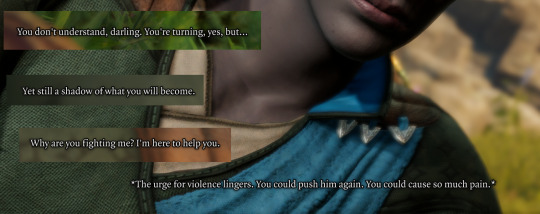
After having the second dream, we can talk about this with our companions. All of them, except by Astarion, explain that their dreams were about desire and power. About a promise.

It's clear for us that Gale dreamt about Mystra and Wyll about Mizora. Both women are the embodiment of power and desire. We don't have a clue who Shadowheart dreamt about, but we know is a he that represents the same values. Astarion is the one who disrupts the pattern.
He dreamt about Cazador, which is for sure the representation of power, but of his desire? At first I thought it was a twisted taste forced onto him over two hundred years of slavery. As a slave, maybe he had to learn how to enjoy the worst things just to endure it, so the incredibly wicked and twisted insinuation of Astarion being attracted to his tormentor... was surprising at first. Especially when you explore his dialogue and he shows a strong bad reaction to such insinuation.
Thinking about it a bit more, I realised that maybe Astarion “desiring” Cazador is another thing he is forced to do against his own will. Or maybe it's the typical consequence of the vampire relationship with the sire: the childe is always attracted to their sire, no matter how much they hate them. Astarion is not even free of having his own desire due to Cazador's power, so... his dream about Cazador was another display of the control that such figure has over him. Therefore, we can say that, in the end, he is also following the pattern, but his desire is commanded by being a vampire spawn.
When it comes to the main char, we also know that such figure in their dreams is someone they are attracted to [that's exactly what we were asked to do in the character creation part].
The tadpole in the main character's head reacts negatively to this desired person, and it’s strange. It can mean that the projection of that figure and the tadpole are not the same (Gale, are you wrong?). The figure acknowledges the presence of the tadpole and the transformation in process, and they seem to be in power of stopping it if only you let them “in”. But the presence of the tadpole is always there while interacting with this figure, uncomfortable and wanting to get away from that desired person. The tadpole feels threatened by this figure.
At times, this beautiful figure feels like an entity proper of a demon, asking you to let it in and possess you. We know by Shadowheart’s comment that this voice appeared in her head when she was in the ship, so that we can assume it started to affect the hosts by the same time the tadpole process started.
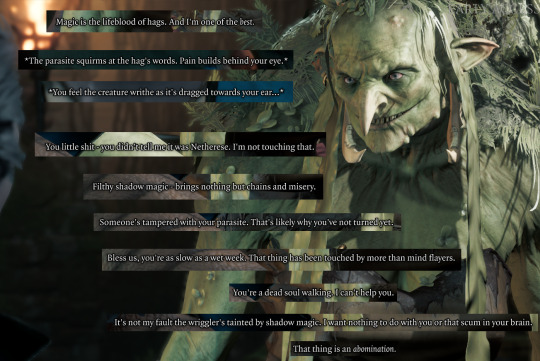
The hag provided us the most valuable information I found out in the game. She confirmed that the tadpole has been altered, as everyone had suspected. But not only that... they had netherese magic, shadow magic (*) in it. This, however, feels wrong in terms of lore: mind flayers detest arcane magic, they believe its a corrupt version of the psionic power they have. Mixing it with their traditional birth procedure looks odd. Odd if this new experiment is only their idea. Maybe the big mind behind these new tadpoles is not a Mind flayer.
With this bit of information given by the hag, I was inclined to think that this magical compound may explain the presence of the person in the main char's dreams. What surprises me is that the tadpole wants the figure away, so how is it possible that both, the figure and the tadpole, work one against the other? If we assume that the tadpoles were altered to perform a transformation of some sort, shadow magic embodied by that figure and the tadpole should work together. However, the tadpole triggers hunger and animal instincts to rip that figure out. It feels endangered. Maybe it’s because the whole procedure is an experiment yet.
The desired figure keeps claiming they want you to help, but in the process, they also tell you that you can be more powerful and conquer Baldur's Gate [yes, despite the blurriness, it is enough to distinguish the characteristic entrance of the city].
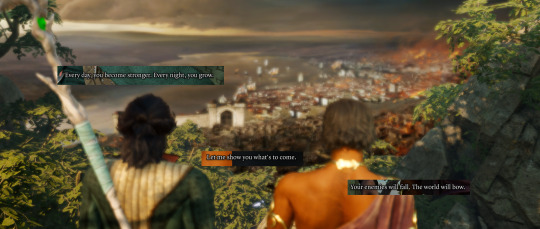
[image from the trailer]

The last dream is one of the most disturbing ones. You awake with symptoms of your skull starting to change its bones, and apparently, the presence of the figure is the only thing which is preventing the transformation. The figure is irritated. You can ask them for help you because the parasite is going too far. The figure says that they need to go deeper into you to calm down the “animal” inside. And once more the tadpole activates a defence mechanism.

You can indulge yourself in the desire of destroying the figure apart, and you ride the figure strangling them and killing them. The figure calls you “monster” and tells you that you deserve what's coming for you [which I assume, it's the standard Mind Flayer transformation]. The experiment may have failed in this way since you destroy the stasis.
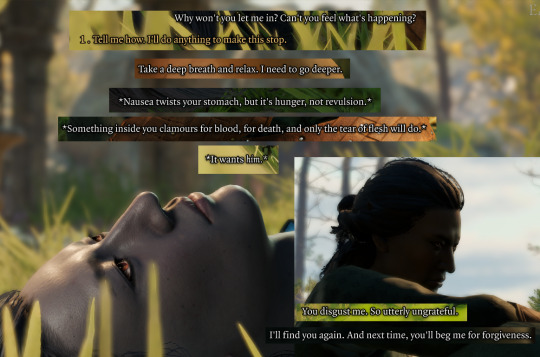
If you resist the impulse of killing them and at the same time resist the intrusion of the figure, the figure is disgusted with you. The figure only is understandable with you when you tell them the truth about your impulse of killing them. They will state that they knew about it, and they trust you to control it while they go deeper into you.
It’s disconcerting if the sudden hunger for death comes from the tadpole (I put my coins here) or from the figure going deeper into you. I assume it’s the tadpole because the figure will call you monster and wont be happy if you indulge yourself in that hunger.
By the end, the figure calls you ungrateful if you resisted them once more and tells you that the next time you meet them, you will ask forgiveness. Early access allows that last dream and no more.
Hypothesis
Now, all these strange urges for murdering the figure makes me wonder if the magical compound that now these tadpole have is related to some evil divine entity, playing a role similar to Bhaal in Baldur’s Gate 1 and 2. In those previous games, you and a bunch of people were direct spawn of the God of Murder, and in a couple of occasions, you had strong urges to kill losing control of your character [and killing NPCs you were fond of]. What if... this new tadpole is an experiment combining the Mind-Flayer procedure of birth (needed in order to have a completely different body for new demi-god powers) with a divine-infused-magical compound from the shadows. What for?. I don’t know... maybe to create an army of demi-gods? [following the usual flavour of Baldur’s Gate series].
This procedure, if it’s as such, could allow to have god-spawn creatures without the God sleeping with mortals and waiting mortal-gestation times. xD If we follow this train of thoughts, and we believe a God is behind all this, it must be some tyrant God, like Bhaal or Bane, since the dreams are all about power and control, showing Baldur’s Gate under siege. Maybe the procedure is not perfect, since there are two different effects working one against the other: The shadow magic that infuses a degree of divinity is about desire and power, but the tadpole’s only interest is to go on with the standard Mind-Flayer procedure.
I thought about this divinity-compound because we saw that there are third parties interested in this new particular tadpole: Raphael. What Gale says to you after his visit is a fact: if a cambion become interested in these tadpoles, it’s because there is more than souls at stakes. But all of these are specualtions. The only certanties are:
Tadpoles are not only Mind-Flayer-made.
They have been altered with Shadow Magic (weird for Mind Flayers).
The Tadpole and the figure which offers you power are different entities.
The more you use powers of command, the more these dreams come and the more it triggers the Mind-Flayer transformation.
The figure in your dreams is the only one preventing the Mind-Flayer transformation.
Conventional tadpoles only cause Mind-Flayer transformation in a week.
Extra information I found later [here]
More content of bg3 in general [here]
-------------
(*) Shadow magic is a Weave-base magic in the Forgotten Realms. It comes from the Shadow Planes connecting to them via the Weave. It's not related to Shadow Weave (an alternate Wave crafted by Shar), something I talked about when explaining some bits of Mystra [here]. You use the standard Mystra-Weave to use shadow magic, but it's not rare that users of shadow magic find some affinity with Shadow Weave. Apparently it's a type of magic strongly related to a human [Tethyrian] ethnic. Churchs of Lolth, Mask, Set, Shar, and Shargaas show interest in this type of magic.
#bg3#baldurs gate 3#bg3 spoilers#baldurs gate 3 spoilers#tadpole#mind flayer#forgotten realms#forgotten realms lore#I'm new at this lore!!!! so help me... this world is so fuckign vast and not always consistent!!! shit#trying to find some continuity of BG3 with Bg1 and 2#there is always a god behind every big shit... so....#is it bhaal again??#bg3 lore#bg3 meta
21 notes
·
View notes